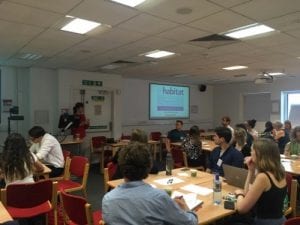The 2017 UCL TechSharing Seminar Series
By Nathan Davies, on 10 November 2017
In this post Nikki Newhouse discusses a very successful 2017 for the UCL TechSharing Seminar Series. Not sure what they are or want to become involved?? Have a read!
The TechSharing Seminar Series is organised by a group of early career researchers from UCL Interaction Centre, the Research Department of Primary Care and Population Health (eHealth Unit), the Department of Clinical, Educational and Health Psychology and the Department of Behavioural Science and Health. The aim of the seminar series is to foster knowledge exchange and future collaboration between researchers, practitioners, policy-makers and industry professionals working within or at the boundaries of health technologies and digital behaviour change interventions.
The series has been active since 2014 and has brought together a wide audience around key topics in digital health research and practice including creativity, communication, methodology and policy impact. Led by early career researchers, the seminar series places UCL students and the UCL community at its heart, and sees an audience drawn from across multiple UCL departments and academic disciplines. The series’ healthy reputation means that the audience is enriched by contributors and audience members from outside UCL: students from other academic institutions, technology developers, clinicians and policy-makers.
The most recent iteration of the series was funded by a UCL Policy Challenge Award. Three interlinked seminars explored the practice and process of embedding technology within the NHS.
Seminar 1 – Bridging the interdisciplinary gap
The first seminar in May 2017 interrogated multidisciplinary teamwork within the context of digital health technologies. The day started with a thought provoking talk by Carmelo Velardo, Senior researcher in Digital Health at the Institute of Biomedical Engineering and Departmental Lecturer at the Department of Engineering Science, University of Oxford. Carmelo’s research focuses on the use of technology solutions to support patients suffering from chronic conditions.
Carmelo was followed by coffee fuelled small group discussions during which attendees critically examined the meaning of key terms, such as engagement, co-design, evidence, implementation and impact/effectiveness. The lively audience was comprised of computer scientists, health professionals, human-computer interaction researchers, psychologists and industry professionals including those from software development, media and banking. This was then followed by a panel discussion with participants drawn from academia, industry and health policy and facilitated by Dr Henry Potts, deputy director of CHIME, UCL’s Centre for Health Informatics & Multiprofessional Education.
Seminar 2 – Co-designing for health
The second seminar in June 2017 focused on the principles of co-design in the context of digital health and provided a practical introduction to the topic. The session was led by Dr Victoria Betton, Founder & Director of mHabitat. Co-design activities included understanding and creating personas, user stories and translating these into design solutions.
Dr Roisin McNaney, Human Computer Interaction Lecturer at Lancaster University then presented a case study on co-designing and enacting tools to support young people’s engagement with people with dementia. We closed the session with a panel discussion facilitated by Dr Julia Bailey, Clinical Senior Lecturer in Primary Care with UCL’s eHealth Unit and a Speciality Doctor in Community Sexual Health.
Seminar 3 – Is it worth it? Getting your digital product into NHS (or choosing not to)
The third and final seminar of the 2017 series saw academics, policy-makers and developers come together in October to debate pressing issues facing those attempting to embed health technology within UK’s healthcare system. The seminar also served as an introduction to the key rules, regulations and realities of getting health tech adopted by the NHS.
The audience enjoyed presentations from Yinka Makinde (DigitalHealth.London), Professor Elizabeth Murray (UCL eHealth Unit) and Dr. Anne Bruinvels (Px HealthCare) before engaging with the lively panel discussion, moderated by Professor Ann Blandford (UCL Interaction Centre & IDH) which included our speakers as well as Indra Joshi (NHS England) and Susannah Robinson (Public Health England).
Future plans
The series website hosts a collection of blog posts that have been widely disseminated using social media (https://ucltechsharingseminars.wordpress.com/). Planning for the 2018 series is under way and the organising committee is keen to hear from anyone who would like to be involved, either as a speaker or as part of the planning team. Please get in touch with Nikki Newhouse for further information (nikki.newhouse.14@ucl.ac.uk)
ECL TechSharing Team
Nikki Newhouse
PhD student – Department of Computer Science (UCL Interaction Centre) and the Department of Population Health and Population Health Research (eHealth Unit)
Olga Perski
PhD student – Department of Clinical, Educational and Health Psychology
Anna Roberts
PhD student – Department of Behavioural Science and Health
Paulina Bondaronek
PhD student – Department of Population Health and Population Health Research (eHealth Unit)
Dr Aneesha Singh
Postdoctoral researcher – Department of Computer Science (UCL Interaction Centre)
 Close
Close







